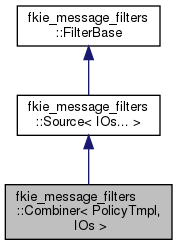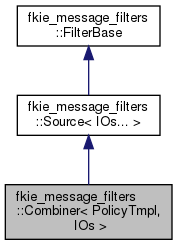Combine multiple sources into a single one. More...
#include <fkie_message_filters/combiner.h>


Public Types | |
| using | Connections = std::array< Connection, NUM_SINKS > |
| Array of connection objects. | |
| using | Output = IO< Outputs... > |
| Grouped output types. More... | |
| using | Policy = PolicyTmpl< IOs... > |
| Class type of the policy that applies to the combiner. | |
| template<std::size_t N> | |
| using | SinkType = helpers::io_rewrap_t< helpers::select_nth< N, IOs... >, Sink > |
| Base class for the Nth sink. | |
Public Member Functions | |
| Combiner (const Policy &policy=Policy()) noexcept | |
| Constructor. More... | |
| Connection | connect_to_sink (Sink< Outputs... > &dst) noexcept |
| Connect this source to a sink. More... | |
| Connections | connect_to_sources (helpers::io_rewrap_t< IOs, Source > &... sources) noexcept |
| Convenience function to connect all sinks at once. More... | |
| void | disconnect () noexcept override |
| Disconnect from all connected sources and sinks. More... | |
| void | disconnect_from_all_sinks () noexcept |
| Disconnect from all connected sinks. More... | |
| void | disconnect_from_all_sources () noexcept |
| Disconnect the sinks from their sources. More... | |
| const Policy & | policy () const noexcept |
| Access combiner policy. | |
| void | reset () noexcept override |
| Reset filter. More... | |
| void | set_policy (const Policy &policy) noexcept |
| Set combiner policy. More... | |
| template<std::size_t N> | |
| SinkType< N > & | sink () noexcept |
| Access the sink for the Nth input. | |
| template<std::size_t N> | |
| const SinkType< N > & | sink () const noexcept |
| Access the sink for the Nth input. | |
Static Public Attributes | |
| static constexpr std::size_t | NUM_OUTPUTS |
| Number of output arguments. | |
| static constexpr std::size_t | NUM_SINKS = sizeof...(IOs) |
| Number of sinks. | |
Protected Member Functions | |
| void | send (const Outputs &... out) |
| Pass data to all connected sinks. More... | |
Detailed Description
template<template< typename... > class PolicyTmpl, class... IOs>
class fkie_message_filters::Combiner< PolicyTmpl, IOs >
Combine multiple sources into a single one.
Sometimes, a filter pipeline will receive corresponding inputs from different sources, which must be processed together. The combiner provides a policy-driven way to aggregate data from multiple sources into a single sink. Policies can be anything from a simple FIFO to an elaborate approximate time stamp synchronization.
The output arity of the filter is the sum of all input arities. For example, given two binary input filters (M1,M2) and (M3,M4), the combiner will create a quaternary output (M1,M2,M3,M4). Furthermore, policies which examine data generally look at the first argument of each input. In this example, the timing policies would match the inputs based on M1 and M3. You can prepend a Selector filter to swap the argument order if you need a different element examined, or the Divider filter to match all arguments independently.
- See also
- combiner_policies, Divider, Selector
Member Typedef Documentation
◆ Output
|
inherited |
Grouped output types.
This type can be used to define sinks with matching types.
Constructor & Destructor Documentation
◆ Combiner()
|
explicitnoexcept |
Constructor.
policyInstance of the policy class that applies to the combiner.
- Exceptions
- Does not throw any exceptions.
Member Function Documentation
◆ connect_to_sink()
|
noexceptinherited |
Connect this source to a sink.
Can be called multiple times to connect multiple sinks; in that case, the sinks receive data in the same order as they have been connected. This function does basically the same thing as Sink::connect_to_source(), only from the opposite point of view.
dstthe sink that is to be connected
- Returns
- a connection object that can be used to monitor or sever the created connection
- Exceptions
- Does not throw any exceptions.
◆ connect_to_sources()
|
noexcept |
Convenience function to connect all sinks at once.
- Exceptions
- Does not throw any exceptions.
◆ disconnect()
|
overridevirtualnoexcept |
Disconnect from all connected sources and sinks.
- Exceptions
- Does not throw any exceptions.
Reimplemented from fkie_message_filters::Source< IOs... >.
◆ disconnect_from_all_sinks()
|
noexceptinherited |
Disconnect from all connected sinks.
Severs the connection to all sinks, turning the send() method into a no-op.
- Exceptions
- Does not throw any exceptions.
◆ disconnect_from_all_sources()
|
noexcept |
Disconnect the sinks from their sources.
- Exceptions
- Does not throw any exceptions.
◆ reset()
|
overridevirtualnoexcept |
Reset filter.
This will reset the internal state by calling the PolicyTmpl::reset() method
- Exceptions
- Does not throw any exceptions.
Reimplemented from fkie_message_filters::FilterBase.
◆ send()
|
protectedinherited |
Pass data to all connected sinks.
outdata
- Exceptions
- Does not throw any exceptions, but will propagate uncaught exceptions from filter callbacks.
◆ set_policy()
|
noexcept |
Set combiner policy.
Any previous policy is superseded. Implies a call to reset().
- Exceptions
- Does not throw any exceptions.
The documentation for this class was generated from the following file:
- include/fkie_message_filters/combiner.h
 1.8.13
1.8.13